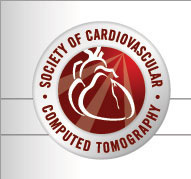Society of Cardiovascular Computed Tomography Implores Use of Appropriate Imaging
by
Barbara Kram, Editor | April 16, 2009

SCCT
Washington, D.C. - The results of the Detection of Ischemia in Asymptomatic Diabetes (DIAD) study, released in the Journal of the American Medical Association (4/15/09 see DM 8774)(JAMA), found that myocardial perfusion imaging (MPI) screening for coronary artery disease (CAD) in asymptomatic patients with type 2 diabetes did not result in a significant reduction in the rate of heart attacks and death compared to patients who were not screened.
In the DIAD trial, which included 1,123 participants with type 2 diabetes and no symptoms of CAD, patients were randomly assigned to be screened (n=561) for CAD using MPI, or not to be screened (n=562). The average follow-up was 4.8 years, and researchers found that when analyzed according to randomization, there were 15 events in the screening group vs. 17 events n the no-screening group. Of those in the screened group, 409 participants with normal results and 50 with small MPI defects had lower cardiac event rates than the 33 with moderate or large MPI defects. Coronary angiography was performed within 120 days after screening in 4.4% of the screened group. By comparison, only three of the patients in the no-screening group underwent angiography within 120 days after randomization. As the authors note, these figures do not support MPI as being a good screening test for asymptomatic CAD in diabetic patients.
"The problem with screening diabetics with MPI is that this test detects coronary arteries with enough plaque in the arteries that blood flow is restricted. A large proportion of diabetic patients don't have any plaque buildup in their arteries." said cardiac imager, Daniel S. Berman, M.D., SCCT president and Chief of Cardiac Imaging and Nuclear Cardiology at Cedars-Sinai Medical Center. "The use of coronary calcium scanning, a less expensive procedure that can detect the earliest stages of disease, offers a tool to select the patients who might benefit from the MPI procedure."
CAD is the leading cause of death in individuals with type 2 diabetes. MPI can be an excellent diagnostic tool in symptomatic patients, but is not appropriate for assessing the plaque burden, which would be the most likely cause of myocardial infarction in the asymptomatic patient.
Coronary calcium scoring clearly and accurately identifies the risk in an asymptomatic patient, as reported by Detrano et al in "Coronary Calcium as a Predictor of Coronary Events in Four Racial or Ethnic Groups," published in The New England Journal of Medicine, March 27, 2008. Detrano et al found that "The coronary calcium score is a strong predictor of incident coronary heart disease and provides predictive information beyond that provided by standard risk factors." (N Engl J Med 2008; 358:1336-45.)
About the Society of Cardiovascular Computed Tomography
(SCCT) is the recognized representative and advocate for physicians, scientists, and technologists who work in the field of cardiovascular computed tomography. With a membership of over 4,000, it is nationally and internationally viewed as the principal independent organization committed to the further development of cardiovascular computed tomography through education, training, accreditation, quality control, and research. For more information on the Society's Mission and Goals, please see the SCCT Website at: www.SCCT.org.
�
